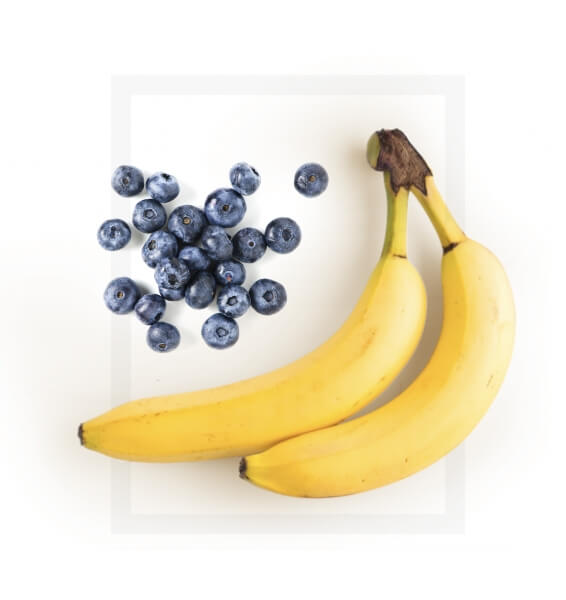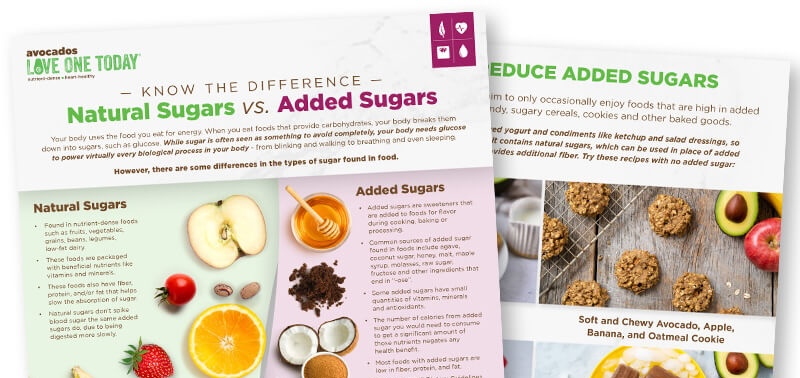Sugar consumption in America has been steadily rising for decades. Eating too much sugar can increase your risk of serious health problems. That’s why added sugars are included on Nutrition Facts labels and the USDA Dietary Guidelines suggest limiting it in your diet.
What about fruit? Is sugar from fruit bad for you and does it count toward your daily limit? In this article, we’ll dive deeper into the differences between added and natural sugars, how they impact you, and what foods can help you eat less sugar.
Added and Natural Sugars
Added sugars are sweeteners, including sugars and syrups, that are added to foods for flavor and texture. Added sugars increase the sugar and calorie content of foods. They’re found in candy, cookies, granola bars, cereal, flavored yogurt, soda, condiments, and many other packaged foods.
Natural sugars refer to those that naturally occur in single-ingredient foods, like fruit, vegetables, plain milk, and yogurt.
Here are the biggest differences
between added and natural sugars:
-
1
Nutrient density
Natural sugars are packaged with more beneficial nutrients than foods with added sugars. For example, milk contains calcium and fruit has vitamins, minerals, and fiber. -
2
Rate of digestion
Foods with natural sugars tend to be digested more slowly due to the presence of fiber, protein, and/or fat. Most foods with added sugars are low in these nutrients. The more slowly food is digested, the longer it takes for sugar to be absorbed. -
3
Effect on blood sugar
All foods that contain sugar will raise blood sugar to some degree. This is known as the glycemic response. However, natural sugars don’t spike blood sugar the same way added sugars do, due to being digested more slowly.
If you’re cutting back on sugar, you may be wondering if you can still eat fruit because of its sugar content. Fruit contains natural sugar, as well as fiber, micronutrients, and antioxidants that support good health.
Fruit can help you reduce added sugar intake. The sugar content in fruit is typically much lower than many foods with added sugars, but the natural sweetness can still help satisfy a sweet tooth.
The fiber in fruit helps you feel full, supports digestive health, and prevents blood sugar spikes. Choose whole fruit, such as fresh, frozen, canned, or dried fruit, or 100% fruit juice. Whole fruits contain fiber and juices don’t.
PRO TIP: always check the facts label when considering fruit drinks to avoid added sugar.

Avocados are a great fresh fruit option to help boost fiber intake.
Diets rich in healthy foods containing fiber, such as some vegetables and fruits, may reduce the risk of heart disease, obesity, and type 2 diabetes.
Fruit contains natural sugars, which can be used
in place of added sugar to sweeten recipes.

To add natural sweetness and delicious flavor to smoothies, try adding 1 cup of fresh or frozen berries or a medium banana.
PRO TIP: peeled and frozen bananas add a milkshake-like texture to smoothies.
Mashed bananas, canned fruit in juice, no sugar added applesauce, or dried fruit can also replace some or all of the sugar in many baked goods, including quick breads, muffins, cookies, and cakes.
For the best results and flavor for baking with fruit, try these tips:
- You can typically replace ½ cup to 1 cup of granulated sugar in a recipe with an equal amount of fruit.
- Puree or mash canned or very ripe fresh fruit before adding to recipes.
- If using bananas, choose very ripe ones with brown spots on the skins and mash them before adding to a batter.
- Soak figs, dates, or prunes in hot water for 5 to 10 minutes, then puree in a blender before adding to a batter.

Some fruits contain more natural sugar than others. If you need to limit sugar intake for blood sugar control, reach for avocados.
Unlike most other fruits, avocado contains zero grams of naturally occurring sugar per serving and does not affect the glycemic response.
The bottom line? Whole fruit is a nutritious part of a balanced diet. Reach for fruit to help satisfy sweet cravings.




